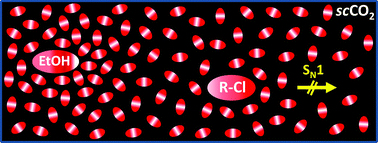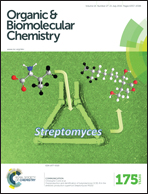SN1 reactions in supercritical carbon dioxide in the presence of alcohols: the role of preferential solvation†
Abstract
Ethanol (3b) inhibits SN1 reactions of alkyl halides 1 in supercritical carbon dioxide (scCO2) and gives no ethers as products. The unexpected behaviour of alcohols 3 in the reaction of alkyl halides 1 with 1,3-dimethoxybenzene (2) in scCO2 under different conditions is rationalised in terms of Brønsted and Lewis acid–base equilibria of reagents, intermediates, additives and products in a singular solvent characterised by: (i) the strong quadrupole and Lewis acid character of carbon dioxide, which hinders SN2 paths by strongly solvating basic solutes; (ii) the weak Lewis base character of carbon dioxide, which prevents it from behaving as a proton sink; (iii) the compressible nature of scCO2, which enhances the impact of preferential solvation on carbon dioxide availability for the solvent-demanding rate determining step.



 Please wait while we load your content...
Please wait while we load your content...